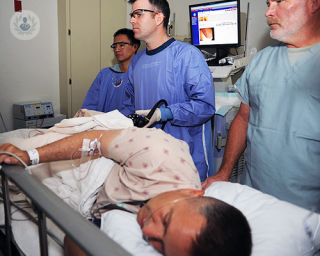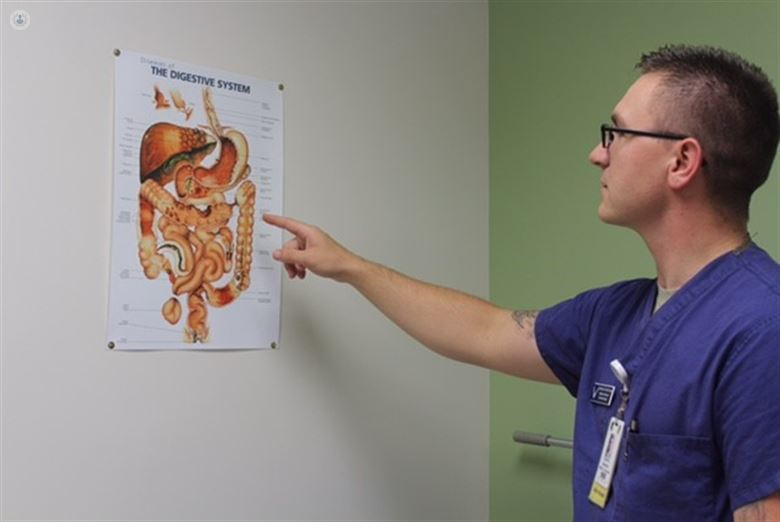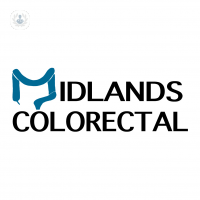What is it?
Bowel cancer, also known as colorectal cancer, originates from the development of tumour cells in the mucosa of the bowel. Given that the colon and the rectum are connected, the cancer often develops in one area and spreads to the other: that is why it is also called colorectal cancer.
It has been estimated that this type of cancer is the third largest cause of death in developed countries, and is more common in men than in women. Even though it is a fairly widespread cancer, if detected early survival rate is around 80%.
What are the symptoms?
The main symptoms of colorectal cancer include:
- a sudden and persistent change in your bowel habit
- persistent blood in the stool
- unexpected weight loss
- general fatigue
- anaemia
- lumps in the abdominal area
However, these symptoms can be very mild and can be confused with symptoms for other conditions. That is why you should always pay attention to possible signs such as fatigue (asthenia), loss of appetite and anaemia.
How is it diagnosed?
This condition can be diagnosed with exams such as colonoscopy, sigmoidoscopy, or a colorectal X-ray scan.
What causes it?
One of the main causes of colorectal cancer is genetic predisposition. If there’s a family history of cancer or polyps, your possibility of getting this cancer increases by as much as four times.
An unhealthy diet and a sedentary lifestyle can also lead to developing this type of cancer. The same goes for smoking and excessive alcohol consumption. Finally, chronic inflammatory disease of the bowel can also increase your risk of getting colorectal cancer.
How can it be prevented?
You cannot completely prevent bowel cancer but you can take steps to reduce your risk. According to the latest research, some foods and drink may increase your chances of getting bowel cancer. These include: red meat, processed meat and alcohol. Being overweight or obese can also lead to bowel cancer. On the other hand, an active lifestyle and eating a diet rich in fibre, garlic and milk seems to have a positive effect on bowel health.
How can it be treated?
If detected early (when the cancer is still restricted to one area), the most effective treatment consists in surgically removing the tumour cells. If your doctor thinks there may be further tumour lesions, after surgery you may get started on chemotherapy. If the cancer is already in its more advanced stages, treatment will be more complex, possibly involving radiotherapy and/or further chemotherapy sessions.
Which doctor should I talk to?
For screening exams, you should see a gastroenterologist. Should you be diagnosed with colorectal cancer, you will need to see an oncologist and a general surgeon.
04-05-2016 12-12-2023Bowel cancer
Professor Hendrik Tobias Arkenau - Medical oncology
Created on: 04-05-2016
Updated on: 12-12-2023
Edited by: Kate Forristal
What is it?
Bowel cancer, also known as colorectal cancer, originates from the development of tumour cells in the mucosa of the bowel. Given that the colon and the rectum are connected, the cancer often develops in one area and spreads to the other: that is why it is also called colorectal cancer.
It has been estimated that this type of cancer is the third largest cause of death in developed countries, and is more common in men than in women. Even though it is a fairly widespread cancer, if detected early survival rate is around 80%.
What are the symptoms?
The main symptoms of colorectal cancer include:
- a sudden and persistent change in your bowel habit
- persistent blood in the stool
- unexpected weight loss
- general fatigue
- anaemia
- lumps in the abdominal area
However, these symptoms can be very mild and can be confused with symptoms for other conditions. That is why you should always pay attention to possible signs such as fatigue (asthenia), loss of appetite and anaemia.
How is it diagnosed?
This condition can be diagnosed with exams such as colonoscopy, sigmoidoscopy, or a colorectal X-ray scan.
What causes it?
One of the main causes of colorectal cancer is genetic predisposition. If there’s a family history of cancer or polyps, your possibility of getting this cancer increases by as much as four times.
An unhealthy diet and a sedentary lifestyle can also lead to developing this type of cancer. The same goes for smoking and excessive alcohol consumption. Finally, chronic inflammatory disease of the bowel can also increase your risk of getting colorectal cancer.
How can it be prevented?
You cannot completely prevent bowel cancer but you can take steps to reduce your risk. According to the latest research, some foods and drink may increase your chances of getting bowel cancer. These include: red meat, processed meat and alcohol. Being overweight or obese can also lead to bowel cancer. On the other hand, an active lifestyle and eating a diet rich in fibre, garlic and milk seems to have a positive effect on bowel health.
How can it be treated?
If detected early (when the cancer is still restricted to one area), the most effective treatment consists in surgically removing the tumour cells. If your doctor thinks there may be further tumour lesions, after surgery you may get started on chemotherapy. If the cancer is already in its more advanced stages, treatment will be more complex, possibly involving radiotherapy and/or further chemotherapy sessions.
Which doctor should I talk to?
For screening exams, you should see a gastroenterologist. Should you be diagnosed with colorectal cancer, you will need to see an oncologist and a general surgeon.


What are the bowel cancer warning signs and red flags that shouldn't be ignored?
By Mr Steve Pandey
2025-01-20
Here, in one of our latest articles, we speak to highly experienced and revered consultant colorectal surgeon, Mr Steve Pandey to talk about the main warning signs and red flags of bowel cancer that patients should watch out for and report immediately. See more


Bowel cancer: when it is better not to have surgery?
By Professor Tan Arulampalam
2025-01-20
Deciding whether or not to have an operation for cancer is a very difficult dilemma. Do we always get it right? Consultant surgeon, Mr Tan Arulampalam, argues that patients need better information about the consequences of all the treatment options available including not operating in certain circumstances. See more


What does a colonoscopy procedure involve and why and how is it performed?
By Mr Rajeev Peravali
2025-01-20
Just what exactly is a colonoscopy, why is it performed and what is it used to detect? On hand to answer all of these colonoscopy-related questions is highly revered consultant colorectal surgeon, Mr Rajeev Peravali. See more


What’s the best way to test for colon cancer?
By Mr David McArthur
2025-01-19
Colorectal cancer, also known as colon cancer or bowel cancer, can be a worrying prospect, especially as we get older. Regular screening is important, especially for those over the age of 60. But how do we test for colorectal cancer? Expert colorectal surgeon Mr David McArthur explains. See more
Experts in Bowel cancer
-
Dr Aathavan Loganayagam
GastroenterologyExpert in:
- Bowel cancer
- Endoscopy
- Irritable bowel syndrome (IBS)
- Inflammatory bowel disease (IBD)
- Indigestion (dyspepsia)
- Colonoscopy
-
Miss Sarah Mills
Colorectal surgeryExpert in:
- Piles (haemorrhoids)
- Inflammatory bowel disease (IBD)
- Endoscopy
- Colorectal cancer
- Bowel cancer
- Anal fistula surgery
-
Mr Alastair Windsor
Colorectal surgeryExpert in:
- Bowel cancer
- Inflammatory bowel disease (IBD)
- Anal fissure
- Hernia
- Irritable bowel syndrome (IBS)
- Diverticular disease
-
Mr Tariq Ismail
Colorectal surgeryExpert in:
- Colorectal cancer
- Hernia
- Bowel cancer
- Colonoscopy
- Haemorrhoid surgery
-
Mr David McArthur
Colorectal surgeryExpert in:
- Colonoscopy
- Hernia
- Colorectal cancer
- Haemorrhoid surgery
- Laparoscopy
- Bowel cancer
- See all

Sussex Premier Health Hastings
Sussex Premier Health Hastings
The Ridge, St Leonards, Hastings, Saint Leonards-on-sea TN37 7RE
No existe teléfono en el centro.
By using the telephone number provided by TOP DOCTORS, you automatically agree to let us use your phone number for statistical and commercial purposes. For further information, read our Privacy Policy
Top Doctors

Midlands Colorectal
Midlands Colorectal
Little Aston Hall Dr, The Royal Town of Sutton Coldfield, Birmingham, Sutton Coldfield B74 3UP, United Kingdom
No existe teléfono en el centro.
By using the telephone number provided by TOP DOCTORS, you automatically agree to let us use your phone number for statistical and commercial purposes. For further information, read our Privacy Policy
Top Doctors

The Birmingham Colorectal Clinic
The Birmingham Colorectal Clinic
Spire Parkway Hospital, 1 Damson Drive, Solihull. B91 2PP
No existe teléfono en el centro.
By using the telephone number provided by TOP DOCTORS, you automatically agree to let us use your phone number for statistical and commercial purposes. For further information, read our Privacy Policy
Top Doctors
-
Sussex Premier Health Hastings
The Ridge, St Leonards, Hastings, Saint Leonards-on-sea TN37 7RE, HastingsExpert in:
- Cataracts
- General Surgery
- Orthopaedic surgery
- Diagnostics
- Ophthalmology
- Urology
-
Midlands Colorectal
Little Aston Hall Dr, The Royal Town of Sutton Coldfield, Birmingham, Sutton Coldfield B74 3UP, United Kingdom, Sutton ColdfieldExpert in:
- Robotic abdominal surgery
- Colonoscopy
- Inflammatory bowel disease
- Hernia
- Laparoscopic hernia surgery
- Cancer Treatment
-
The Birmingham Colorectal Clinic
Spire Parkway Hospital, 1 Damson Drive, Solihull. B91 2PP, SolihullExpert in:
- Colonoscopy
- Inflammatory bowel disease
- Hernia
- See all
- Most viewed diseases, medical tests, and treatments
- Immunotherapy
- Alzheimer's disease
- CAR-T cells
- Hormone therapy
- Hodgkin's lymphoma
- Nutrition
- Genetic testing
- Nipple discharge
- Abdominal pain
- Minimal access surgery (keyhole surgery)









